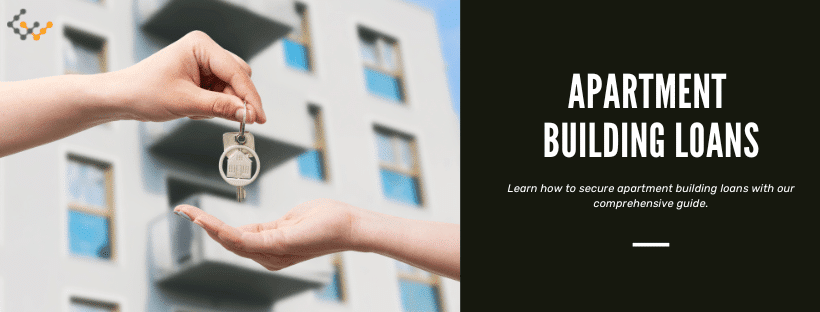A Comprehensive Guide to Apartment Building Loans

Multifamily residential real estate can provide substantial and fairly reliable returns, but almost no one purchases these properties as cash investments. Multifamily residential properties are usually instead financed with apartment building loans, of which there are several options. Here’s a guide to securing and using apartment building loans.
What Are Apartment Building Loans?
Apartment building loans are specialized financing products for the purchase, renovation, or refinancing of multi-family residential real estate properties. These loans are generally for buildings with five or more units in them.
The size of an apartment building loan depends on what financing is needed to purchase a property (and what a borrower qualifies for). Balances can be anywhere from $100,000 to many millions.
Benefits of Investing in Apartment Buildings
Compared to other real estate investment options, apartment buildings offer some unique advantages:
- Consistent Income: Spreading out rental income across multiple units diversifies away from any one tenant. Rents received tend to be more consistent across an apartment building than they would be from a single house or duplex.
- Resilient Sector: Residential is more resilient than most other sectors of real estate investing. While office space, retail stores, and industrial complexes are subject to economic trends and seasons, people always need a place to live.
- Asset Appreciation: While the value of any property is likely to rise over time, the values of apartment buildings in popular and growing areas can appreciate faster than average.
- Loan Programs: Some apartment buildings qualify for special loan programs that offer lower rates, higher amounts borrowed or other benefits. This is especially true when purchasing a property with low-income apartments for rent.
Different Types of Loans for Apartment Buildings
Many different loan programs are available for apartment buildings. Some are general and available for most apartment buildings, while others have specific restrictions that must be met. In general, the main apartment loan options that are available are:
- HUD/FHA Apartment Loans: Only certain properties can qualify for a HUD or FHA apartment building loan. Properties normally have to provide low-income housing, and borrowers must meet stricter requirements. For those that qualify, the FHA 223(f) and FHA 221(d)(4) offer some of the highest LTVs, longest terms, and most competitive interest rates.
- Freddie/Fannie Apartment Loans: Freddie Mac and Fannie Mae both have apartment building loans that are widely used, and often the second-best option (after HUD/FHA). The agencies’ Small Balance loan programs offer long-term, fixed-rate financing at competitive APRs.
- CMBS Apartment Loans: CMBS loans can be a good option for larger apartment complexes that don’t meet the criteria for HUD/FHA or Freddie/Fannie loans. CMBS loans tend to be for higher balances, and they have competitive terms.
- Bank Apartment Loans: Usually more flexible than other loan programs, but typically don’t have the benefits of a government or even agency loan. These are usually used only when other financing options have been exhausted.
- Short-Term Apartment Loans: Usually for periods between 6 months and 3 years. Typically have higher interest rates than other loans, but don’t come with the same strict prepayment penalties. Bridge loans tend to have higher application criteria than hard money loans do. Either may be appropriate when flipping or soon refinancing an apartment loan.
Eligibility Criteria and Qualifications for Apartment Building Loans
So, how to get a loan for an apartment building? The criteria used to evaluate loan applications vary depending on the specific program. Broadly speaking, lenders consider the following qualifications:
- Credit Score: Minimum credit scores are usually ~600-640, with hard money loans accepting lower scores.
- Experience: The amount of real estate experience investors have is important to varying degrees. Some programs prefer investors with demonstrated experience, while others are less concerned about this.
- Property: The property’s location, size, condition and occupancy rate are all taken into account, as they would be for any investment property loan.
- Projections: Projected net operating income calculations, along with other calculations, are done to check that a property is financially viable.
What is the Application Process Like for Apartment Building Loans?
Applying for an apartment building loan follows a fairly straightforward and standard process. You can expect to go through the following::
- Pre-Approval: Submit an initial application to become pre-approved. The application will include your financial information, property information, contact information, and some other details.
- Property Evaluation: Lenders will evaluate the property to make sure it meets the loan requirements. They’ll order an appraisal, and look at comps, rent roll, P&Ls and similar data.
- Underwriting: Your complete application will go through underwriting, after which the lender will make a determination as to whether your application is approved. Sometimes additional information is needed before or during the underwriting process.
- Disbursement: If approved, you’ll receive the disbursed funds on closing day. They’ll be applied to the purchase price.
Documents to Prepare for Apartment Loan Applications
When applying for an apartment loan, be prepared to provide the following:
- Personal financial statements
- Business financial statements
- Tax returns (personal and business)
- Rent roll (list of all leases and income)
- Property appraisals and inspections (to be ordered)
- Credit report (lender pulls)
How Much Downpayment is Required?
Most lenders require a downpayment of 20 to 25% for a commercial property loan, including an apartment building loan. Some government programs allow borrowers to put down as little as 15%, but these are only for select programs.
Expect to have a maximum loan-to-value (LTV) ratio of 75-80%, which equates to a 20-25% down payment.
How Long Does the Approval Process Take?
How long it takes to become approved for an apartment loan depends on the borrower and the property to some extent. The biggest factor is the loan program, however, as the program is what dictates the information that must be provided and evaluated.
Bank and CMBS apartment building loans can typically be underwritten in 30-45 days.
Government-backed apartment loans can take longer, even as much as 60-180 days, depending on what details the specific program must check.
5 Tips to Improve Your Chances of Approval for an Apartment Building Loan
As with any loan application, there are steps you can take to improve the likelihood of approval:
- Get Experience: if you’re inexperienced, partner with someone who’s invested in multifamily residential properties before.
- Keep Records: Make sure to keep current, accurate, and detailed financial records, so the underwriter can easily understand all that they need to.
- Put More Down: A larger down payment gives you more skin in the game and may make lenders more willing to provide a loan.
- Choose the Right Property: A well-maintained property in a prime location is easier to underwrite a loan for, as it’ll be worth more if ever foreclosed on.
Wrapping Up
An apartment building investment can provide sustained and substantial returns, and loans offer access to these investments. Use this information to choose an apartment loan program to apply to, and then submit the strongest application you’re able to. You soon could have a sizeable multifamily real estate property that collects rent regularly.

